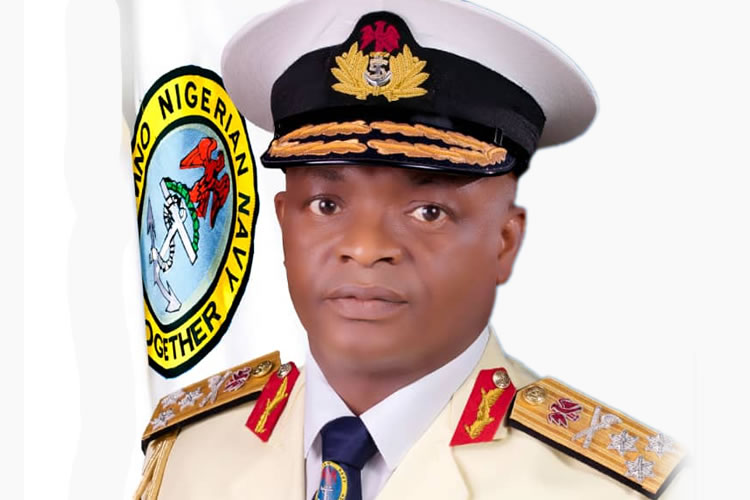Given the intensity and trans-national nature of marine crimes in the region, Vice Admiral Awwal Gambo, the Chief of the Naval Staff (CNS), pushed for a database for maritime offenders, particularly pirates, yesterday.
He believes that combating maritime crimes like as piraczzy, crude oil theft, and pipeline sabotage, among others, necessitates a more thorough record-keeping and data-gathering effort.
Gambo explained that once criminals have been apprehended, convicted, and served their sentences, they typically relocate to neighbouring countries in the sub-region to continue their illegal operations, necessitating the creation of a complete database.
The CNS gave a major presentation titled “Protecting Critical National Infrastructure: Tackling Maritime Crimes; Protecting Nigeria’s Ports” at the 10th SECUREX West Africa, an international security exhibition held in Lagos.
“Despite the Nigerian Navy’s (NN) efforts to curb maritime crime, new difficulties continue to emerge as a result of criminals’ dynamic character,” he stated.
“The severity and transnational character of maritime crimes in the region necessitates a more thorough record-keeping and data collection effort to identify perpetrators.”
“Unfortunately, the lack of an effective database on known offenders has allowed perpetrators of marine crimes to go from one country to the next without being identified.”
Read Also: APC Has Caused Disunity in Nigeria, Atiku Laments
“Some people who were convicted of marine crimes have continued their criminal operations in other nations undetected after their sentences were completed.”
“There is a need to pay more attention to and address this gap within the West African sub-region.”
” Clearly, with better database and information sharing on people charged with marine crimes, it would be easier to monitor and catch them if they continued to commit crimes.
“It is instructive to remark that, because events at sea are always influenced by events on land, it would be required to solve issues of unemployment, poverty, and illiteracy, lest dangers to critical infrastructure, particularly at sea, persist.”
“Depending on where the naval forces are most effective, the threats may change in shape and structure.” This highlights the importance of developing a functional naval force in other GoG countries in order to establish a credible presence in our common maritime domain.”
He added, however, that the navy has continued to enhance its procedures in terms of strategy, operational ideas, and doctrinal practises, as well as ensuring port facility safety through the Secured Anchorage Area initiative, which is run in partnership with the Nigeria Ports Authority (NPA).
Meanwhile, the Nigerian Navy has detained 117 people and seized six vessels in the previous five weeks over alleged petroleum product theft, according to the CNS.
The arrests and seizures, he added, were made by operatives assigned to Operation Dakatar Da Barawo (Stop the Thief), a resurgent campaign against crude oil thieves, unlicensed refiners, and pipeline saboteurs.
Over 17,793,432 litres of crude oil, 5,490,670 litres of illegally processed AGO, and 129,000 litres of DPK, altogether valued at over N10.7 billion, were reportedly deactivated, 563 metal storage tanks crushed, and 341 dug out pits destroyed within the same period, according to him.
“Nigeria’s maritime environment accounts for around 12% of the entire Gulf of Guinea,” Gambo added, emphasising the importance of the maritime industry to the country’s economic well-being. Over 85% of all trade with the rest of the globe is carried out by sea.
“The country’s oil and gas reserves are estimated to be 36 trillion barrels and 182 trillion cubic feet, respectively, with a daily production capability of 2.4 million barrels and 8 billion cubic feet.
“Additionally, oil corporations operate 5,779 wells, 9,717 kilometres of pipelines, 112 flow stations, 16 gas plants, and 126 offshore production platforms.”
Read Also: National Assembly and the HAJJ Savings Scheme
“As a result, the maritime industry, together with associated infrastructure, plays an important role in Nigeria’s essential economic interests (albeit it is often overlooked), encompassing operations such as shipping, fishing, and resource exploitation, among others.”
“The sector, which is known to house a variety of infrastructure, is critical to Nigeria’s survival, prosperity, and maintenance of her enviable place in the international community.
“Any obstruction thereto, therefore, would have unfavourable ramifications for the nation’s economic existence and, by extension, the Gulf of Guinea.”


